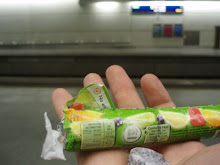Chindini itself is a windswept maze of concrete and basalt and looks much the same as every other town on Grande Comore, as if a volcano has rolled through a building site. Chindini is built on one of the few stretches of coast not made out of hard black volcanic rock, with the coastline breaking up enough to provide a small natural harbour and beach. As a result, the town is home to the largest fishing fleet in South East Grande Comore and the town's entire population consists almost entirely of fishermen and their families.
The boat itself was little more than a fibreglass hull, roughly patched with resin and paint, with a 25 HP Yamaha outboard (they have to be Yamaha) strapped to the back. Comfortable seating came in the form of a pair of wooden benches, also held in place by large volumes of resin and prone to snapping in rough weather, dumping anyone unfortunate enough to be sitting on them to the floor. A minor comfort was found by sitting on life jackets, rendering them completely worthless as buoyancy aides and also proving practically useless for cushioning blows to the arse in rough seas.
The boat captain and I had a pretty good system worked out for deciding where to go. First, we'd jet out of the harbour and smash through the walls of breakers until we hit the open ocean. If we made it through the waves without capsizing, I'd scan the sea trying to figure out which part looked calmest or most fish filled and yell some instructions in broken Franglais, "Allez a gauche!" or something similar, which Captain Privé would then laugh at and jam the outboard in the opposite direction to whatever I had instructed. Occasionally I'd try and outmanoeuvre him, giving the opposite directions to where I felt we should be going, but he'd always see through my ruse and take us straight into the huge rolling 10 metre nightmare waves. We were a good team. He was the captain, I was ballast to keep the boat from flipping over.
Our main targets were members of the Scrombridae family, including chunky 5 kilo tuna and smaller 2.5 kilo bonito, although occasionally we'd see other fishermen bringing in barracuda, espadon and even sharks. These fish all put up quite a bit of a fight, and whenever we were lucky enough to get a bite, the race was on to pull the 75 metre line in, hand over hand, before either the fish scarpered, the line snapped, or something bigger swallowed our prey. The last 5 metres or so of yanking would always prove the hardest, when the hooked fish would begin thrashing around and trying to swim away from the boat as if it's life depended on it.
Once landed, we'd take turns grabbing the unfortunate victim by the tail or gills and smashing it over the head with a big chunk of wood, until it stopped flapping around and died. This could take several whacks, and get extremely messy, as my blood splattered rash vest and board shorts can attest.
Occasionally the whales would pop back up to say hi.
Around midday, we'd head back in to Chindini and try and find a buyer for our catch. Whilst the men of the town are out catching the fish, the women act as brokers, selling off the returning cargo as it arrives back in port. Some of it stays in Chindini, but a lot of the catch is loaded into taxis and buses and shipped along the coast, some of the fish making it as far markets in Grande Comore's capital city Moroni.
So this was the routine as I played at being a fisherman and wrapped up my time in the Comoros. All too quickly I found myself flying back out over Kilimanjaro, heading for the UK and the inevitable drift back into old routines, along with that nagging doubt that any of it really happened.
Probably not.

















